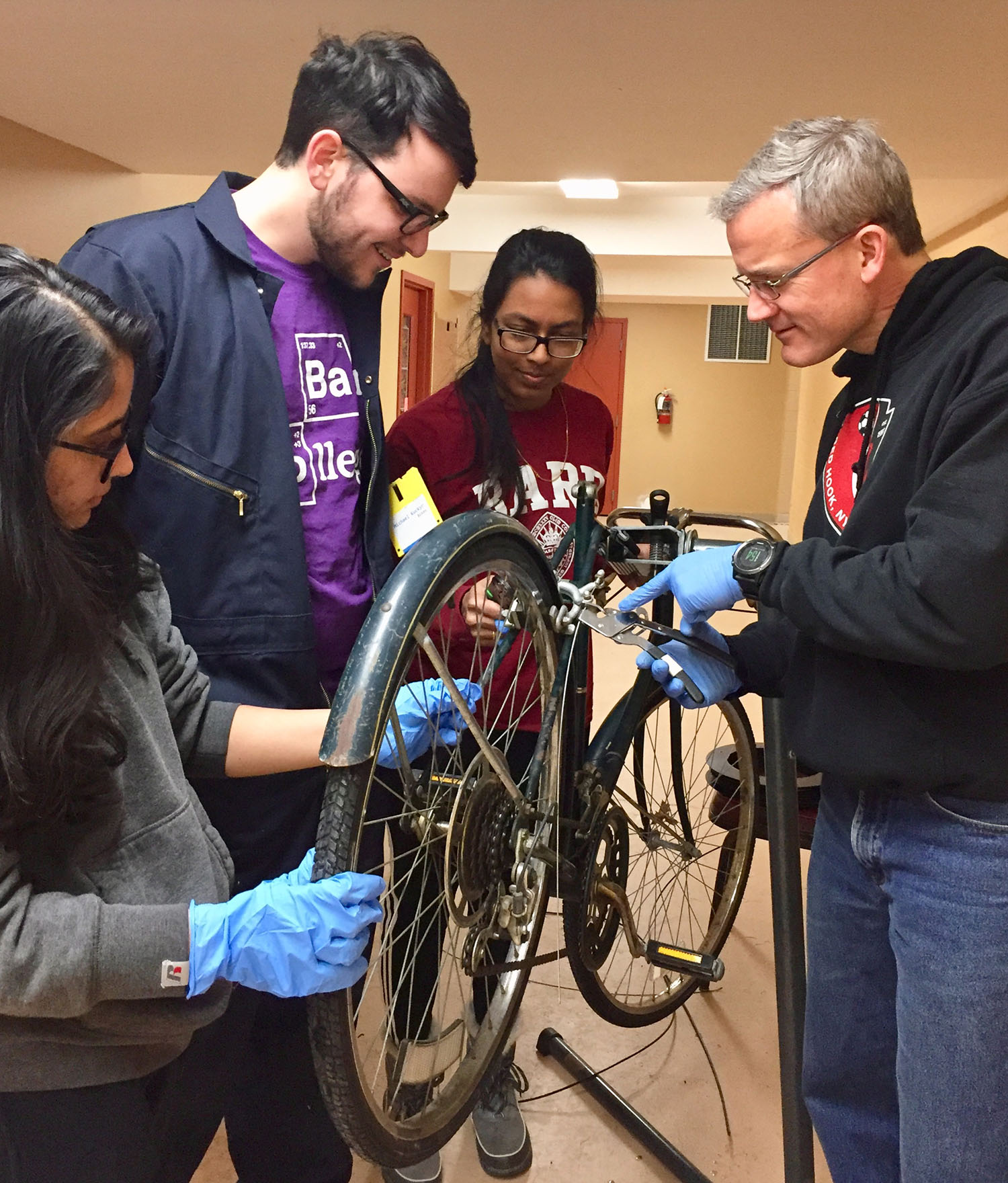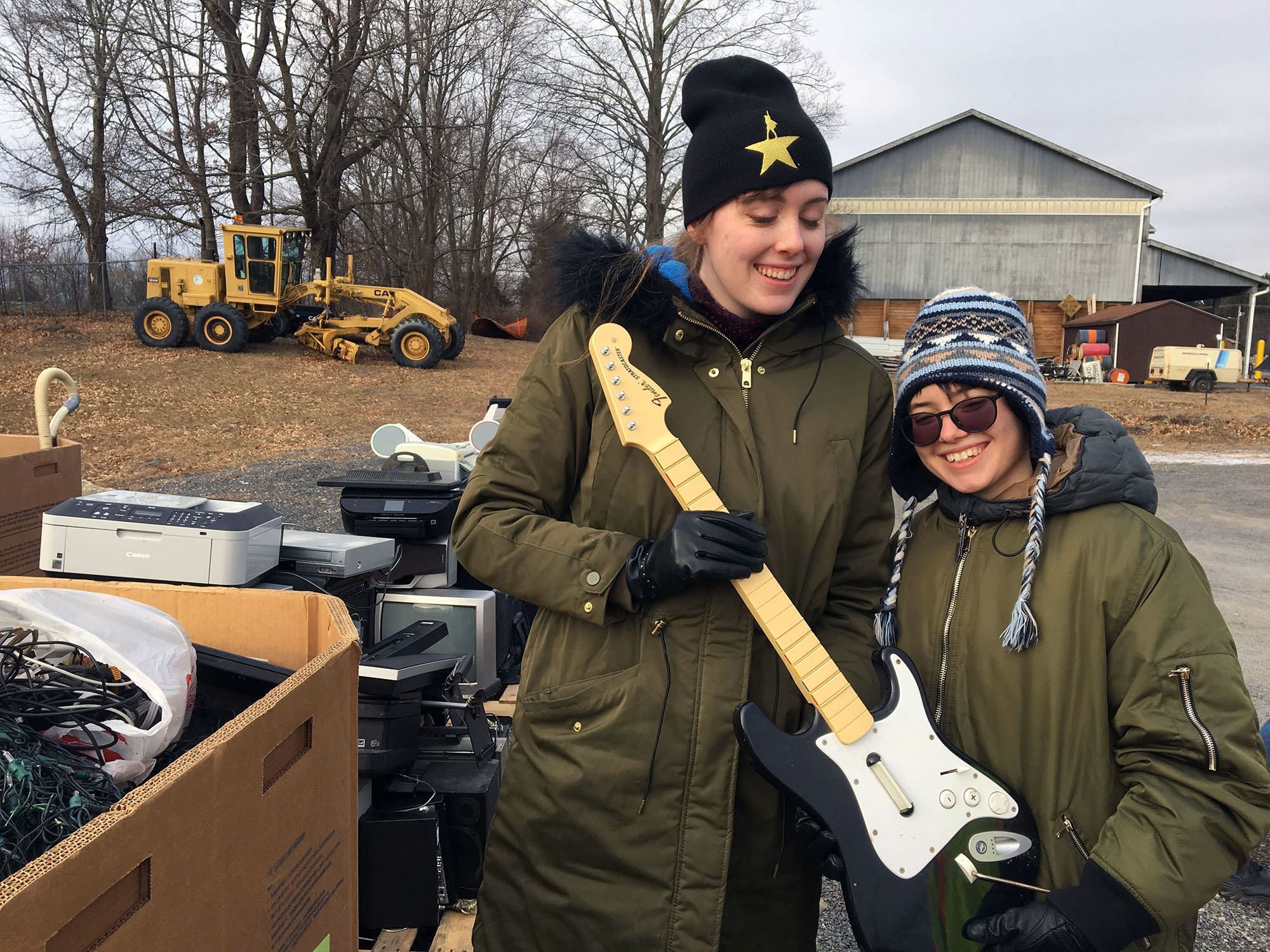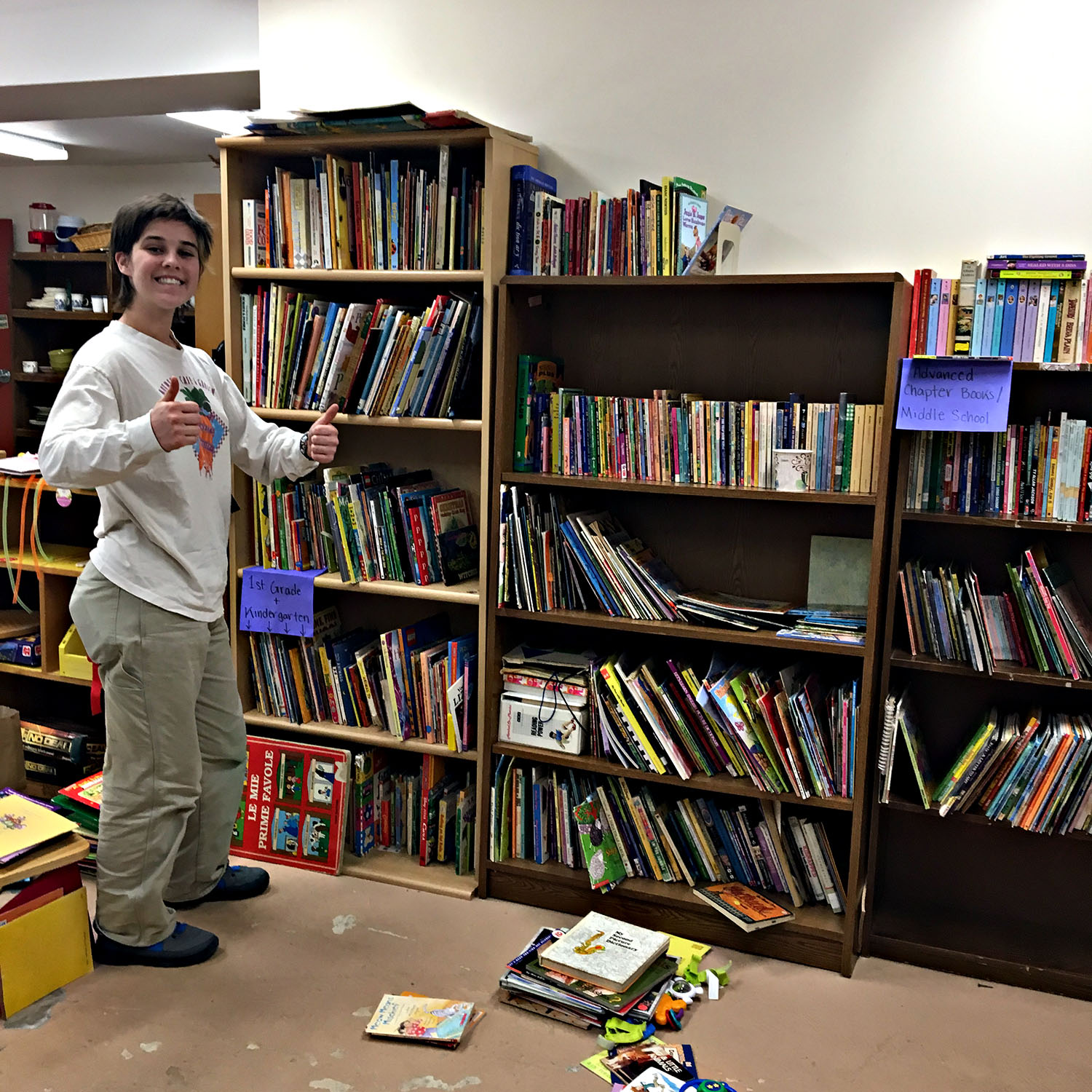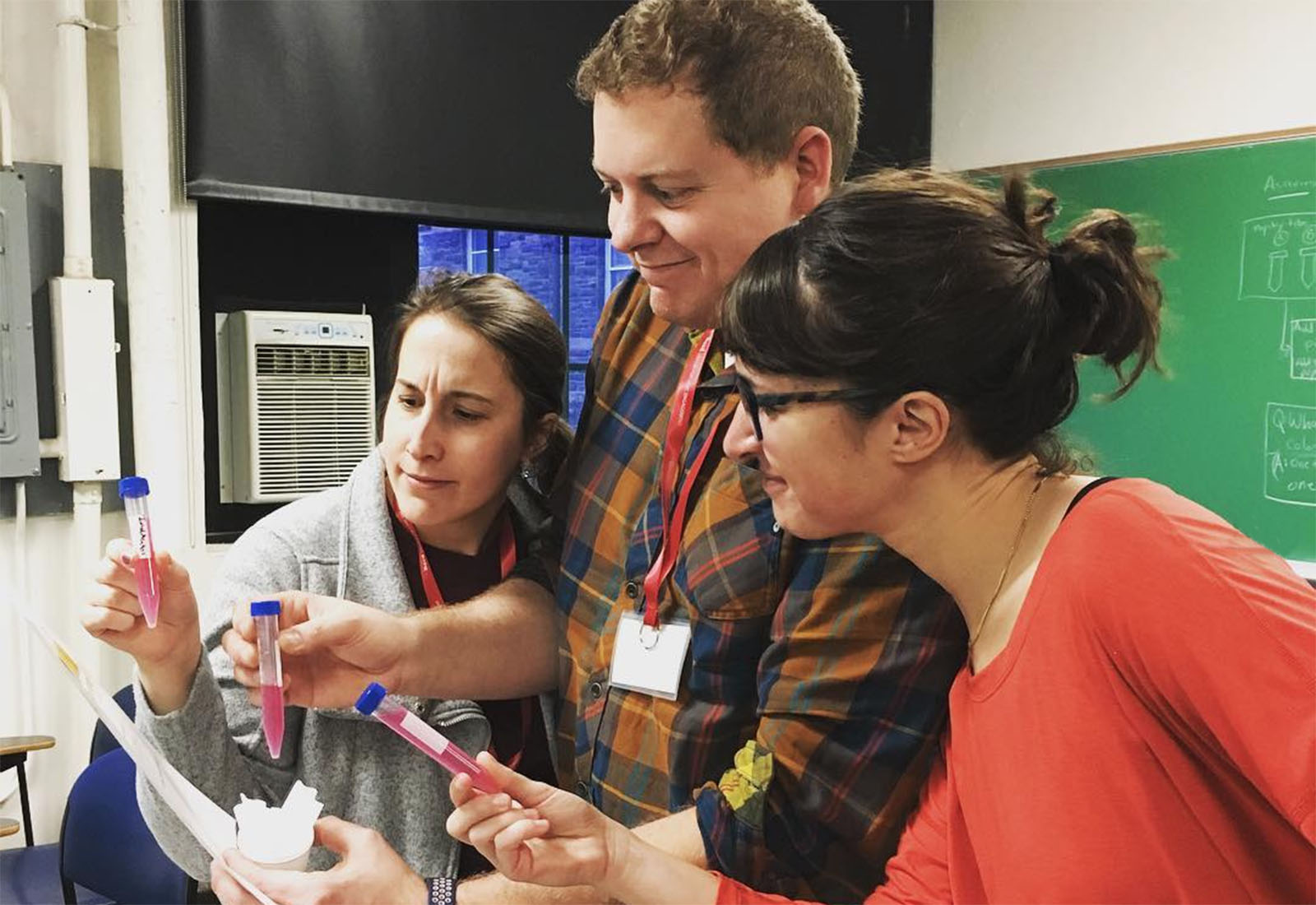Sustainability News by Date
Results 1-4 of 4
January 2019
01-29-2019
Established in fall 2018, the Bard Center for the Study of Land, Air, and Water is growing quickly to address environmental issues from the ground up—on campus and off.
Meta: Type(s): Event | Subject(s): Community Engagement,Division of Science, Math, and Computing,Environmental/Sustainability | Institutes(s): Bard Undergraduate Programs,Center for Civic Engagement |
Meta: Type(s): Event | Subject(s): Community Engagement,Division of Science, Math, and Computing,Environmental/Sustainability | Institutes(s): Bard Undergraduate Programs,Center for Civic Engagement |
01-29-2019
The new Bard Center for the Study of Land, Air, and Water is an interdisciplinary program that connects Bard faculty, staff, and students with grassroots efforts to protect the environment. The center looks to address a variety of challenges, from access to clean drinking water to the effects of climate change, using quantitative research and other tools that span academic disciplines, including the natural and social sciences, humanities, and the arts.
“Our goal is to develop accessible, applicable, community-centered solutions to local and regional environmental problems,” says M. Elias Dueker, center director and assistant professor of environmental and urban studies. “Currently, we tackle these problems in courses throughout the College, in faculty-directed student research, and through community- and student-run environmental monitoring programs.”
The Center leverages the interdisciplinary platform of Bard’s Environmental and Urban Studies Program to bring social and political issues together with scientific study, to create effective solutions to complex environmental issues. “In an age where we can’t depend on national-level resource management, we’ve become more and more aware—as community members, as academics, as students, and as professionals—that environmental change must begin, literally and figuratively, at the grassroots,” says Dueker. In response, the Center is developing a Land Lab to bring science to the vibrant agricultural communities that surround the College, and its Sustainable Solutions Lab is bringing rigorous scientific testing to bear on efforts to mitigate human impacts on natural resources.
The Center also engages with citizen scientists from across the Hudson Valley through the Bard Water Lab, and participates in local efforts to protect our drinking water and scenic waterways. Through the Water Lab’s partnership with the Saw Kill Watershed Community, Bard faculty and students have been able to collaborate with community members to do research with a real impact, both on campus and within the surrounding area. Ongoing projects include amphibian and eel monitoring, and a comprehensive water quality–monitoring program powered by citizen scientists. For more information, visit waterlab.bard.edu and sawkillwatershed.wordpress.com.
“Community-driven science is key to successfully addressing the pressing issues surrounding access to clean water. From Flint to Hoosick Falls to Newburgh, we are daily being reminded of the importance of community members working to maintain water quality—from the tap to the treatment plant to our local waterways,” says Dueker. “We look forward to continuing to build our capacity to connect community members, decision makers, and the academic community as we all struggle to meet the environmental challenges of climate change—of ensuring clean water, clean air, and equitable food access both in the Hudson Valley and beyond.”
For more information on the Bard Center for the Study of Land, Air, and Water, visit landairwater.bard.edu.
“Our goal is to develop accessible, applicable, community-centered solutions to local and regional environmental problems,” says M. Elias Dueker, center director and assistant professor of environmental and urban studies. “Currently, we tackle these problems in courses throughout the College, in faculty-directed student research, and through community- and student-run environmental monitoring programs.”
The Center leverages the interdisciplinary platform of Bard’s Environmental and Urban Studies Program to bring social and political issues together with scientific study, to create effective solutions to complex environmental issues. “In an age where we can’t depend on national-level resource management, we’ve become more and more aware—as community members, as academics, as students, and as professionals—that environmental change must begin, literally and figuratively, at the grassroots,” says Dueker. In response, the Center is developing a Land Lab to bring science to the vibrant agricultural communities that surround the College, and its Sustainable Solutions Lab is bringing rigorous scientific testing to bear on efforts to mitigate human impacts on natural resources.
The Center also engages with citizen scientists from across the Hudson Valley through the Bard Water Lab, and participates in local efforts to protect our drinking water and scenic waterways. Through the Water Lab’s partnership with the Saw Kill Watershed Community, Bard faculty and students have been able to collaborate with community members to do research with a real impact, both on campus and within the surrounding area. Ongoing projects include amphibian and eel monitoring, and a comprehensive water quality–monitoring program powered by citizen scientists. For more information, visit waterlab.bard.edu and sawkillwatershed.wordpress.com.
“Community-driven science is key to successfully addressing the pressing issues surrounding access to clean water. From Flint to Hoosick Falls to Newburgh, we are daily being reminded of the importance of community members working to maintain water quality—from the tap to the treatment plant to our local waterways,” says Dueker. “We look forward to continuing to build our capacity to connect community members, decision makers, and the academic community as we all struggle to meet the environmental challenges of climate change—of ensuring clean water, clean air, and equitable food access both in the Hudson Valley and beyond.”
For more information on the Bard Center for the Study of Land, Air, and Water, visit landairwater.bard.edu.
Photo: Bard students and Water Lab staff make up the teams that collect and
analyze water samples from the Saw Kill. Photo by Sarah Wallock.
Meta: Subject(s): Environmental and Urban Studies Program,Environmental/Sustainability | Institutes(s): Center for Environmental Sciences and Humanities |
analyze water samples from the Saw Kill. Photo by Sarah Wallock.
Meta: Subject(s): Environmental and Urban Studies Program,Environmental/Sustainability | Institutes(s): Center for Environmental Sciences and Humanities |
01-22-2019
Researchers in northern Kenya have found only benefits in combining moderate numbers of cattle and wildlife, including reduced tick populations and higher-quality grass.
Photo: Bard students and Water Lab staff make up the teams that collect and
analyze water samples from the Saw Kill. Photo by Sarah Wallock.
Meta: Subject(s): Environmental/Sustainability | Institutes(s): Bard Undergraduate Programs |
analyze water samples from the Saw Kill. Photo by Sarah Wallock.
Meta: Subject(s): Environmental/Sustainability | Institutes(s): Bard Undergraduate Programs |
01-21-2019
“Life’s most persistent and urgent question is, ‘What are you doing for others?’” These words from Martin Luther King Jr. are the call to action behind the nationwide Day of Service that takes place on the King holiday. Over 200 Bard students, along with staff and faculty members, took those words to heart as they volunteered with organizations across the Hudson Valley for the College’s Ninth Annual MLK Day of Engagement. The event expanded this year, with volunteer opportunities taking place throughout the holiday weekend, as well as a mini-conference on civic engagement on campus, and a community fair in cooperation with the Red Hook Community Center. The weekend's events were organized by the Bard Center for Civic Engagement, the Office of Sustainability, and the Citizen Science Program.
MLK Day of Service activities expanded this year. In previous years, Bard's service projects have taken place on the Saturday before Martin Luther King Day. This year, the program shifted to focus events on the holiday itself, in alignment with national organizing and celebration. Related events occurred all weekend, however.
A keystone of this year’s day of service was the Red Hook Community Fair, “Beyond Recycling: Repair, Re-Use, Rethink and Commit to Community.” More than 30 Bard students participated at the Red Hook Community Center in a day that included sustainable crafts, cooking and science activities, and opportunities to sign up to volunteer with local organizations.
The organizers also added “Commit to Action,” a mini-conference in Olin Auditorium. Led by local organizers and campus leaders, participants chose from 15 workshops aimed at helping them commit to action in 2019. Making a yearlong commitment was a theme of this year’s MLK Day of Engagement. Organizers emphasized the many ways students could be involved with on- or off-campus groups beyond the holiday weekend. Facilitators focused on helping students build skills to effect change. Workshops included “Literacy for Adolescents: Tutoring as Social Change” and “Getting to Climate Drawdown: The Campus as Learning Lab.”
The conference also featured a panel of local leaders in a conversation that connected their personal stories with their civic action. Panelists included Matthew Martini, Northern Hudson Valley regional representative to the State Comptroller’s Office; Sarah Salem, Poughkeepsie Common Council member; Leslie Tracey, cofounder of the Hudson Valley African American Business Council; Rev. Giancarlo Llaverias, Dutchess County legislator; and Cammie Jones, assistant dean of civic engagement at Bard College.
Bard students worked at more than two dozen sites over the long weekend, ranging from Tomorrow, Tomorrow Animal Rescue outside Hudson to the United Methodist Food Pantry in Red Hook. On Saturday, Bardians continued an annual tradition of donning work gloves and hauling old TVs, stereos, computer towers, and other electronic waste for Red Hook’s E-Waste Day.
In January, Bard science outreach kicks into high gear in conjunction with the Citizen Science program, culminating in a flurry of events around the King holiday. Science outreach activities take place all year through Bard’s Center for Civic Engagement, in which student leaders conduct STEM games and experiments in the Hudson Valley school districts. Volunteers and engagement fellows from CCE gave lessons to local children in conjunction with other student-led science activities around this year’s Citizen Science topic: water.
Read more about the day’s events on the CCE website.
MLK Day of Service activities expanded this year. In previous years, Bard's service projects have taken place on the Saturday before Martin Luther King Day. This year, the program shifted to focus events on the holiday itself, in alignment with national organizing and celebration. Related events occurred all weekend, however.

At the Repair Cafe in Red Hook, Bard students and local volunteers fix bicycles.
A keystone of this year’s day of service was the Red Hook Community Fair, “Beyond Recycling: Repair, Re-Use, Rethink and Commit to Community.” More than 30 Bard students participated at the Red Hook Community Center in a day that included sustainable crafts, cooking and science activities, and opportunities to sign up to volunteer with local organizations.

Bard Students volunteer at Red Hook's annual E-Waste Day.
The organizers also added “Commit to Action,” a mini-conference in Olin Auditorium. Led by local organizers and campus leaders, participants chose from 15 workshops aimed at helping them commit to action in 2019. Making a yearlong commitment was a theme of this year’s MLK Day of Engagement. Organizers emphasized the many ways students could be involved with on- or off-campus groups beyond the holiday weekend. Facilitators focused on helping students build skills to effect change. Workshops included “Literacy for Adolescents: Tutoring as Social Change” and “Getting to Climate Drawdown: The Campus as Learning Lab.”
The conference also featured a panel of local leaders in a conversation that connected their personal stories with their civic action. Panelists included Matthew Martini, Northern Hudson Valley regional representative to the State Comptroller’s Office; Sarah Salem, Poughkeepsie Common Council member; Leslie Tracey, cofounder of the Hudson Valley African American Business Council; Rev. Giancarlo Llaverias, Dutchess County legislator; and Cammie Jones, assistant dean of civic engagement at Bard College.
Bard students worked at more than two dozen sites over the long weekend, ranging from Tomorrow, Tomorrow Animal Rescue outside Hudson to the United Methodist Food Pantry in Red Hook. On Saturday, Bardians continued an annual tradition of donning work gloves and hauling old TVs, stereos, computer towers, and other electronic waste for Red Hook’s E-Waste Day.

A Bard student volunteer organizes the books in the community closet at the Red Hook Community Center.
In January, Bard science outreach kicks into high gear in conjunction with the Citizen Science program, culminating in a flurry of events around the King holiday. Science outreach activities take place all year through Bard’s Center for Civic Engagement, in which student leaders conduct STEM games and experiments in the Hudson Valley school districts. Volunteers and engagement fellows from CCE gave lessons to local children in conjunction with other student-led science activities around this year’s Citizen Science topic: water.

Student engagement fellows train Citizen Science faculty on their water-themed outreach experiments.
Read more about the day’s events on the CCE website.
Photo: (L–R) “Commit to Action” panelists Matthew Martini, Sarah Salem,
Leslie Tracey, Rev. Giancarlo Llaverias, and Cammie Jones.
Meta: Type(s): Event | Subject(s): Education,Environmental/Sustainability,Student,Wellness | Institutes(s): Bard Undergraduate Programs,Center for Civic Engagement,Citizen Science |
Leslie Tracey, Rev. Giancarlo Llaverias, and Cammie Jones.
Meta: Type(s): Event | Subject(s): Education,Environmental/Sustainability,Student,Wellness | Institutes(s): Bard Undergraduate Programs,Center for Civic Engagement,Citizen Science |
Results 1-4 of 4